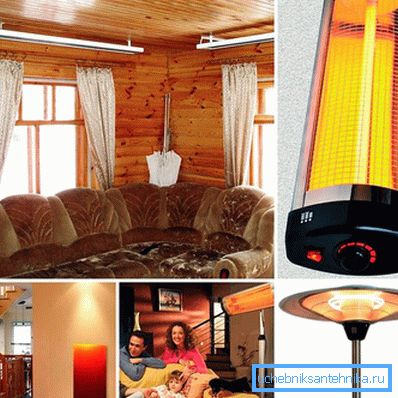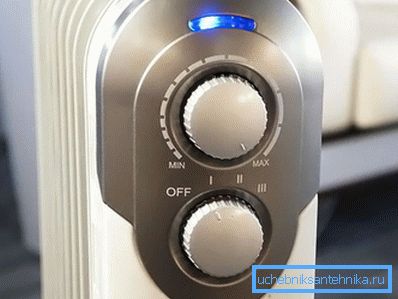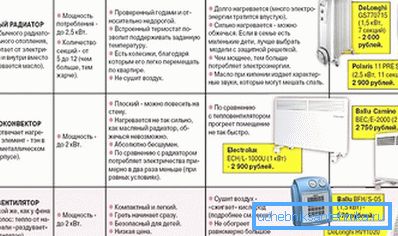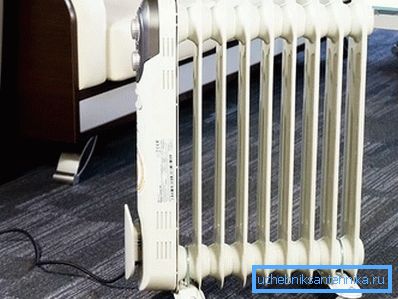How to choose an oil heater for an apartment
With the onset of cold weather, you have to worry about heating your home. If stationary heating for some reason does not work or needs an addition to it, or needs a mobile version of the heater, then you can use a portable electric heater. Modern industry offers a lot of electric heaters, working on different principles. There are convectors, infrared heaters, oil heaters, etc. In this article we will analyze in detail how to choose an oil heater for an apartment, comparing them with convectors.
Design features

The efficiency of oil radiators is that the coolant is mineral transformer oil. It is poured into the device, which is hermetically sealed by the method of spot welding. A high-quality heater is made of metal with a thickness of up to one millimeter, covered with paint, which for durability is polymerized in a special furnace. TEN is in the oil and heats it to a temperature of more than one hundred degrees Celsius. Oil, heating up in a similar way, heats the metal case, which heats the air in the room directly.
A convector is an electrical appliance with a heating element that heats the air. It is enclosed in a metal case with a grate for convection of air.
Both the convector and the oil cooler are equipped with automation and security system.
Advantages and disadvantages

Coming to the store and seeing a lot of similar devices on the shop window, the buyer unwillingly begins to wonder what type to choose - a convector or an oil heater? Each of them has its advantages and disadvantages.
Convector

Benefits:
- small weight;
- compact size;
- air heating rate;
- silent operation;
- possibility of installation on the wall.
Its disadvantages include the unpleasant smell of burnt dust when turned on, the need for free space around and fire hazard when objects hit the heating element.
Oil heater

Benefits:
- silent operation;
- the ability to move around the room to the right place;
- continuation of heating after switching off due to slow cooling of the oil;
- the possibility of drying clothes with a special device;
- availability of the auto-shutdown function. Large dimensions and weight. 2. Injury hazard - due to the ribbed surface, a collision with the device can lead to a noticeable injury, and when touched, due to the high surface temperature of the device, a burn-out. You can not close to the wall.
The common disadvantages of all electric heaters with an open heating element are that they dry the air. Such electric heaters should not be installed in a room with high humidity and open water (bathrooms, showers, baths).
Heater selection

In any case, the choice of the device is based on its power, because both the convector and the oil radiator are powered by electricity.
Convector

This appliance is chosen according to the standard formula: 1 kilowatt heats 10 square meters of space with sufficient insulation. If one device for heating the room is not enough, then install several.
Oil heater

It's not so simple with him. There are some nuances:
- device performance depends not only on power, but also on the thickness of the metal, its fullness in oil, and the area of the section. The larger the area of the heater sections, the thicker the metal from which they are made and the higher the level of oil inside (within reasonable limits), the more heat it will give;
- the presence of a built-in fan accelerates the spread of warm air, and, as a consequence, the heating of the room;
- a special water tank will help to avoid drying out the air in the room;
- It is necessary to choose the power of the radiator with a small margin (about twenty percent). This will help prevent the device from operating at maximum power at low temperatures in winter and will prolong its service life.
- recommended heating area 8–15 m2.
Therefore, a quality device should be quite heavy, with powerful ribs, thermostat, timer, fan, water tray and heated towel rail. But remember that in order to avoid the failure of the device there are several "no":
- put it on the floor - the heating element may not be completely covered with oil, which will lead to its overheating and subsequent explosion;
- move closer to the wall than half a meter - the thermostat will often turn off and quickly burn out;
- to dry things on it - it impairs its heating function;
- Store in a damp and unheated room - the housing may rust, oil will leak and the device will deteriorate.
What to choose

Each type of heater has its own advantages and disadvantages. Which is better, everyone decides for himself, based on where he will be used. When making a choice, also do not forget about the price.
If you need to purchase a heater from another category, then we suggest that you familiarize yourself with the additional materials on our website:
- What to consider when choosing a gas convector?
- How to choose an infrared heater?
- How to choose a convector?
- How to choose electroconvector?
Video
From the provided video review you can find out which is better, a convector or an oil heater: